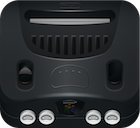
This post covers the Official Nintendo 64 Software Development kit that was sent to developers is actually split among a number of different discs due to its size.
These Discs include:
The N64 Developers toolkit contained all the following applications used for N64 Development:
The CD contains a PC and SGI folder, with the SGI folder simply containing a tar archive of all the contents.
On Windows a Setup.exe file was included that is installed into C:\nintendo\n64kit and contained pre-compiled executables for all of the main applications.
Latest Version: 5.2
Released Versions: 3.0, 4.0, 4.1, 5.0, 5.1, 5.2
Download N64Kit from ultra64.ca
N64kit was distributed to developers in the form of CDs, Ultra64.ca has full CD ISOs of versions 3.0->5.2.
Version 5.1 (10th Feb 2000) of the kit was partially released in the BroadOn archive leak of May 2020 due to its use in the iQue player development.
This is an application that runs on the Nintendo 64 hardware to teach programmers about the RDP features. It has the ability to communicate with a Windows Application called dptest for which the source code is also available.
Windows application that communicates with the N64 application ccbl to save and load configurations.
It works with a number of different N64 development flash cartridges such as:
The Hybrid Vector Quantization (HVQ) algorithm is an effective form of image compression for low bit rate images and can out perform JPEG by between 10 and 20%.
This allowed developers to compress their textures down and allow much more data to be stored on the limited cartridge space provided by the Nintendo 64.
Also since videos are just a collection of images there is a variant of the algorithm called HVQM that compress video content. This folder contains code for both the image and video compression tools.
If a game used the HVQ algorithm they were required to show a logo which was contained in the HVQlogo folder.
The source code suggests that the algorithm may have been written by Hudson.
This folder contains a pre-built Windows executable called hvq2enc.exe for compressing BMP or PPM images into HVQ encoded images.
There is also a version of this tool for video content called hvqm2enc.exewhich supports converting uncompressed AVI files to compressed HVQM2 files.
libHVQ2 is the main static library used to decompress static images (for movies see libhvqm2) on the Nintendo 64. The source code for the library itself is not provided in the SDK, but the header files and the static library files (including RSP microcode) are included along with some pretty decent documentation.
There are two methods of decompressing the data, one is purley CPU using just functions in the static library.
The other uses the CPU to decode half of the data then passes it over to the RSP microcode to do the rest, saving CPU time.
| Filename | Description |
|---|---|
| GUIDE.txt | Tutorial for using both the CPU and RSP versions |
| rspcode/hvq2sp2.o | RSP Microcode to decompress the intermediate image to 32-bit image data |
| rspcode/hvq2sp1.o | RSP Microcode to decompress the intermediate image to 16-bit image data |
| FUNCTIONS.txt | Documentation for each function in the lbirary |
| lib/HVQ2File.h | Contains the HVQ2Header structure for parsing the data header |
| lib/libhvq2.a | The main static library that must be linked to use HVQ functionality |
| lib/HVQmd.h | N64 version of the Machine Dependent (MD) definitions. |
| lib/hvq2dec.h | Header file for all the functions and main structures in the library |
| README.txt | Overview of the folder contents |
NuHVQ is a Nintendo 64 sample project provided by Monegi Corporation to demonstrate loading HVQ compressed images on the N64 via the NuSystem API.
This is a higher level version of the code presented in the sample folder, which essentially does the same thing but without NuSystem.
This example seems to have been forked from the nu4 sample code as it includes the same music and code.
This folder contains the bare-bones implementation of a N64 image viewer for images compressed with HVQ. This does not use the NuSystem API so it is lower level than the nuHvq sample but provides similar functionality.
| Filename | Description |
|---|---|
| hvqwork.c | Variable setup for memory used by HVQ2 RSP microcode |
| sample.hvq | Sample Image compressed with HVQ |
| Makefile | Standard Makefile for building sample |
| system.c | Implements the standard boilerplate code such as mainproc |
| spec | Standard ROM spec file but notably includes the “sample.hvq” image as a segment |
| cfb.c | Just contains the CFBPix Frame Buffer |
| main.c | Contains the sample specific logic to load the HVQ image |
| README.txt | Brief overview of how to use the sample |
| system.h | Header file for all the definitions from main.c |
| hvqbuf.c | Simply defines the HVQ buffer where the image is read into |
The N64 OS was initially released with both SGI and PC versions on the same disc, later it was moved to a disc for each operating system.
On Windows it was installed into C:\Ultra\usr and used a UNIX-like directory structure containing the following folders:
Latest Version: 2.0L Released Versions: 2.0J, 2.0K, 2.0H, 2.0L